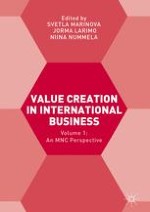
2017 | OriginalPaper | Chapter
1. Meanings and Interpretations of Value and Value Creation
Authors : Svetla Marinova, Jorma Larimo, Niina Nummela
Published in: Value Creation in International Business
Publisher: Springer International Publishing
Activate our intelligent search to find suitable subject content or patents.
Select sections of text to find matching patents with Artificial Intelligence. powered by
Select sections of text to find additional relevant content using AI-assisted search. powered by